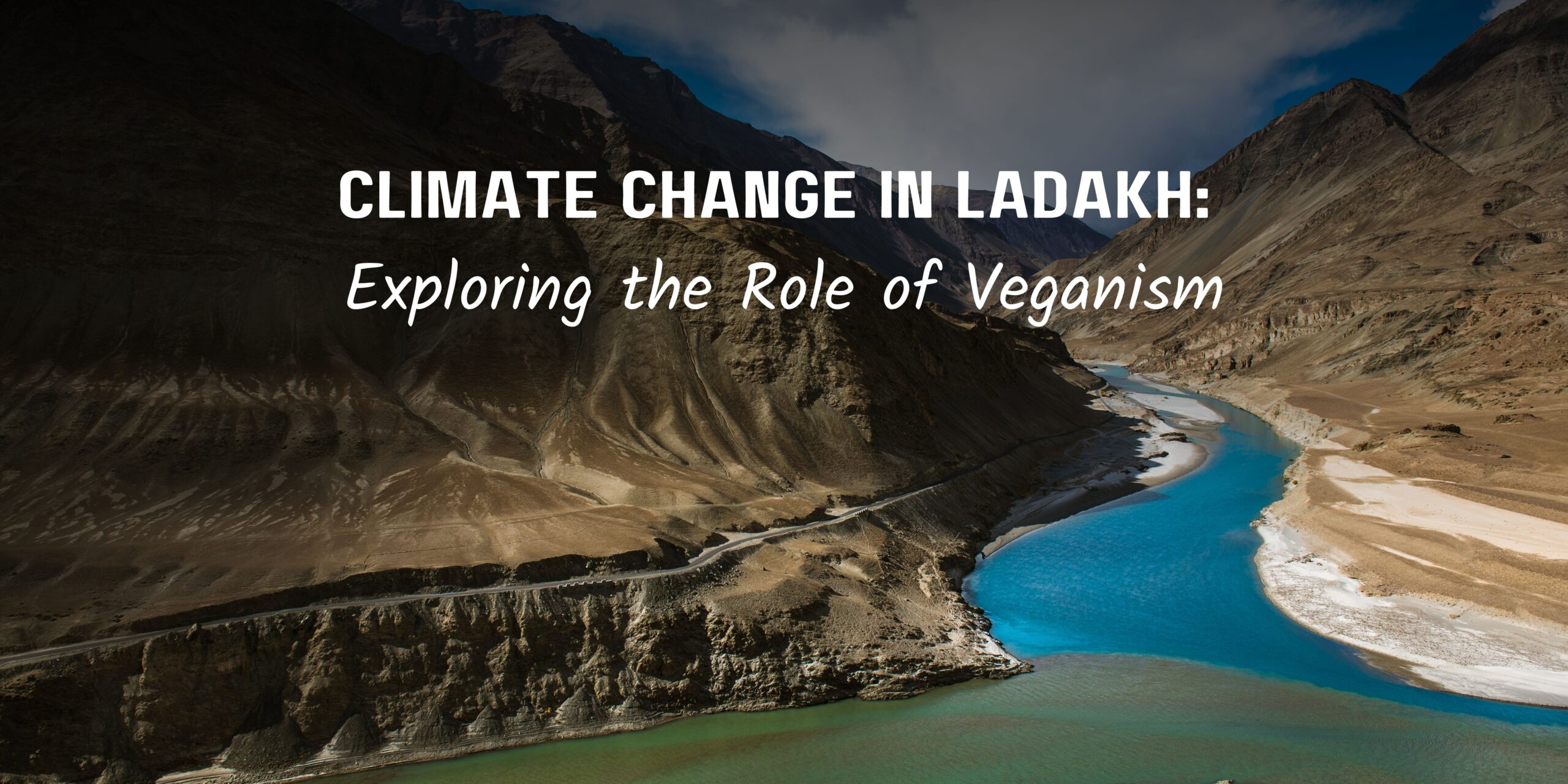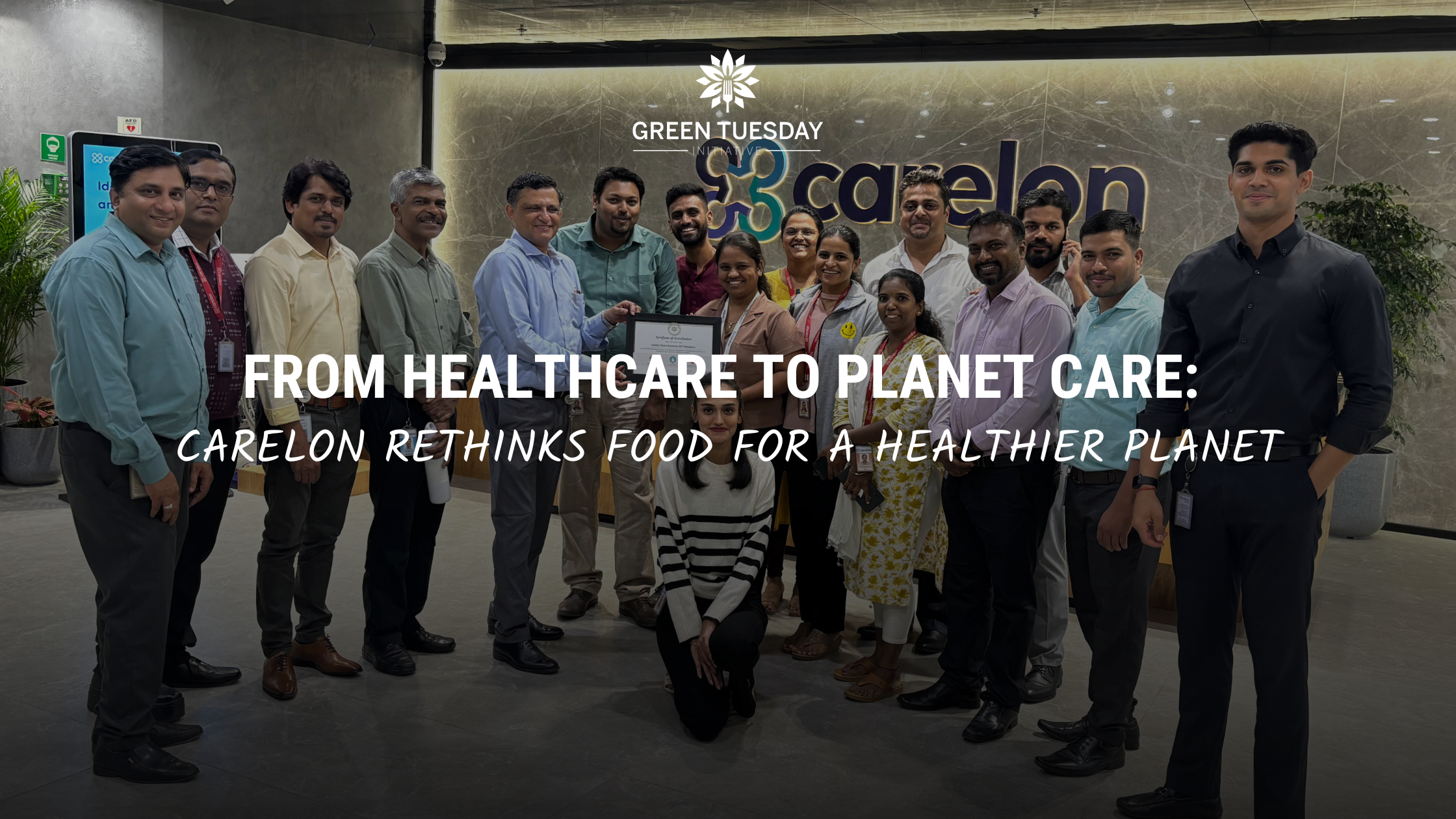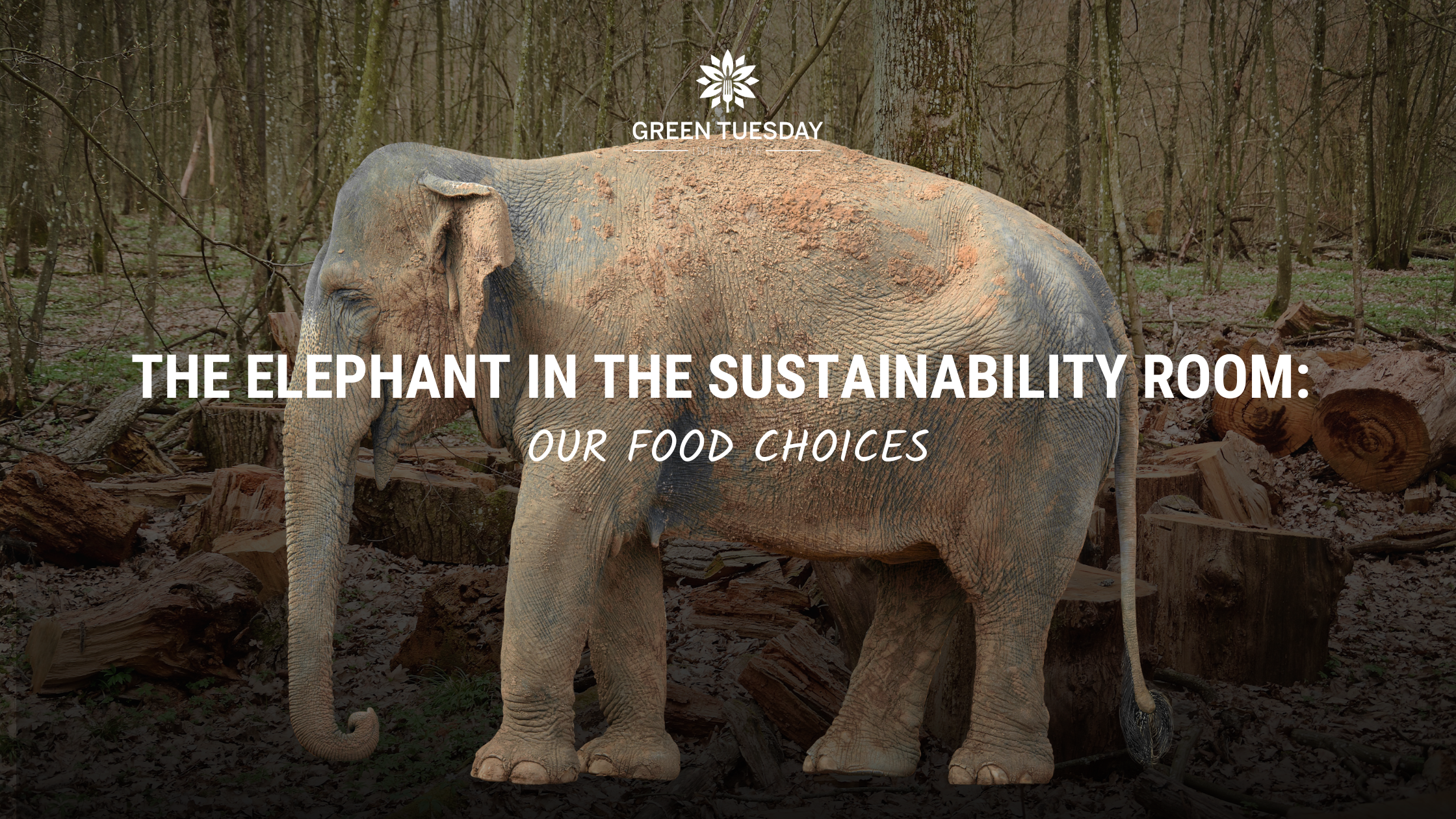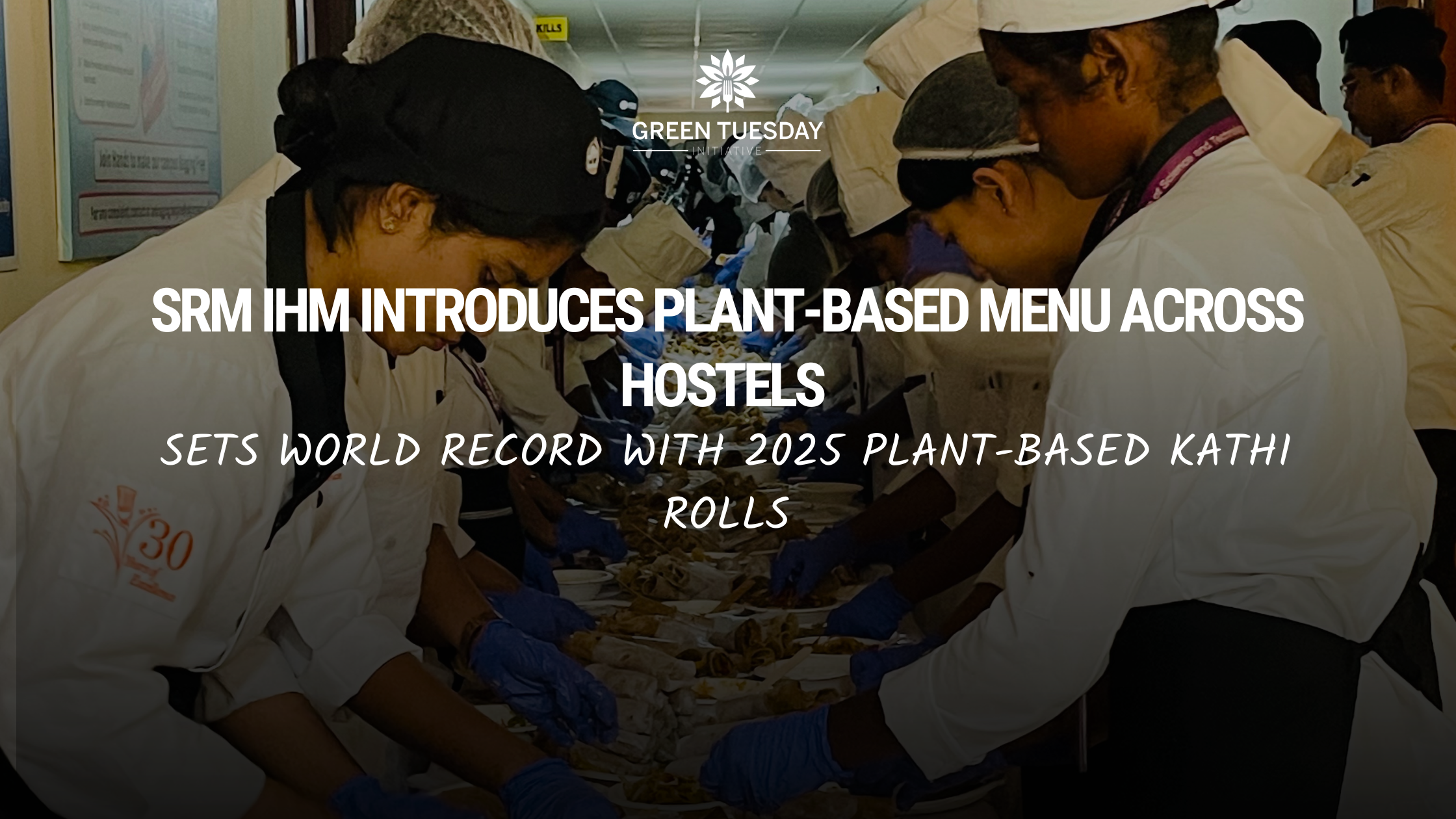Disclaimer: The views and opinions expressed in this article are those of the writer and do not necessarily reflect the views or positions of Green Tuesday Initiative or Vegan Outreach.
Climate Change
Climate change is undeniably becoming a critical global issue that demands immediate attention from all sectors of society, especially the key stakeholders with the power to enact substantial changes. Over the past few decades, we’ve witnessed a significant increase in temperatures, growing water scarcity, reduced snowfall, and heightened agricultural demands in Ladakh. Nearly 90% of farmers in Ladakh rely on snowmelt water for irrigation, highlighting the region’s acute vulnerability to climatic shifts. Although Ladakh is renowned as a tourist destination, its primary livelihood is agriculture, with approximately 70% of the population directly or indirectly dependent on this sector.
The alarming change in temperature is evident, where the minimum temperature in January 2024 increased to -12.4°C, a stark deviation from the usual minimum temperatures of -16°C or below. This deviation highlights the urgency of addressing climate change and developing solutions to tackle its effects promptly.
Climate Change In Ladakh
Water sources in Ladakh such as streams fed by glacial melt, are becoming unreliable due to climate change. It is important to note that Ladakh’s pristine landscapes are rapidly changing due to increasing temperatures. This has caused glaciers, which are essential sources of freshwater for the region, to retreat at a faster pace. Agriculture in Leh heavily relies on irrigation, exerting immense pressure on the already limited water resources. The demand for water in Leh is steadily increasing with population growth and development.
As a result, water scarcity is becoming a major concern that affects agricultural practices and exacerbates tensions over resource allocation. Additionally, extreme weather events such as the flash floods that occurred in Leh town in 2023 are becoming more frequent. These climate changes require urgent mitigation, and efforts toward adaptation are becoming a pressing need for protecting Ladakh’s fragile ecosystems and communities.
The question at hand is, what can we do to address the issue? While there are several solutions and strategies such as policy intervention, awareness-building, and government reforms, they require unanimous participation from all stakeholders involved. However, there is one solution that can be implemented on an individual level that can, collectively, have a profoundly positive impact.
It all comes down to one’s diet. Traditional agricultural practices involve growing crops to feed livestock, which is inefficient in terms of water usage. Logically, producing animal-based foods requires significantly more water than plant-based foods. For example, producing 1 kilogram of beef can require up to 15,000 liters of water, whereas the same amount of vegetables requires only a few hundred liters.
If we look at an Oxford University study, it was found that meat-eaters are responsible for almost double the amount of daily dietary greenhouse gas emissions compared to vegetarians and 2.5 times more than vegans. So, the link between dietary habits and climate change is clear and significant. Individuals can significantly reduce their carbon footprint by avoiding animal products. A plant-based diet conserves land and water resources, mitigating deforestation and habitat destruction and most importantly saving innocent sentient lives.
Plant-Based In Ladakh
The climate of a region significantly impacts food choices. While Ladakh’s culinary heritage has always centered around meat and dairy products, with yak and goat husbandry forming the backbone of the economy, the culinary tastes of the people in the region have evolved considerably over time. It is now essential to note that the staple food in the Ladakhi diet is barley flour. According to the dietary analysis of Ladakh’s inhabitants, 6.8% are vegetarians, 31.03% are eggetarians, and 62.06% are non-vegetarians. This raises the question of whether people in Ladakh can switch to a vegetarian or vegan diet while still obtaining all the necessary nutrients, considering the climate they live in and the answer is arguably positive, people in Ladakh can not only survive but also thrive on a vegetarian diet. Ladakh, a high-altitude region has a traditional diet that includes many vegetarian elements. The local cuisine is heavily influenced by Tibetan culture, which includes numerous vegetarian dishes due to the significant Buddhist population. Examples of the vegetarian diet include tsampa, skyu, thukpa, momos, and local vegetables and legumes.
We have real-life examples of individuals like Tsewang Dolma, a resident of Leh, Ladakh, who has been following a vegetarian diet for over a decade. She mostly relies on a diet of locally grown produce, supplemented with lentils, and occasional nutritional supplements. Furthermore, the monasteries in Ladakh follow a vegetarian diet as part of their spiritual practice.
Ladakh relies on North India’s plains and low-lying areas for its food. These regions are accessible via the Leh-Srinagar and Leh-Manali highways which are closed during winter due to harsh weather conditions. This limits the availability of local agriculture. However, it is well-known that vegetarians can source their protein from beans, lentils, chickpeas, nuts, whole grains, and seeds, which are available even during winter. In summer, there is no shortage of food at all. Ladakh grows green beans, spinach, and fruits such as apples, apricots, peaches, guavas, cherries, and mangoes and with an informed use of supplements, accessing the remaining vitamins is also possible.
There are numerous examples of individuals leading healthy lives by consuming a plant-based diet, provided they do it in a well-informed way. This involves thorough research to ensure a well-rounded diet and taking all necessary supplements to meet their nutritional needs. In Ladakh, where treating animals with compassion is highly valued due to the region’s predominant religion, Buddhism, building a compassionate food system is a tangible possibility. This is underscored by the region’s belief system, which teaches that all living beings have inherent value and should be treated with respect. Therefore, adopting sustainable living methods that resonate with the religious and cultural values of the Ladakhi people is crucial.
Connection Between Climate Change and Veganism
The potential convergence of veganism and climate change awareness in Ladakh highlights the need for comprehensive solutions that address both environmental and socio-economic aspects. It is important to find more ways to incorporate vegan principles into the daily lives of the people. This can be achieved through education campaigns that raise awareness about the horrors of factory farming, fostering empathy, and policy interventions such as subsidies for plant-based agriculture. However, it is also important to keep in mind that the ultimate goal is to minimize the suffering of innocent animals as much as possible. Going vegan is the best way to achieve this, but even then, it does not eliminate all the suffering.
The main focus should be to reduce unnecessary suffering to the extent that it is possible. If someone chooses to go vegetarian or abstain from meat consumption on certain days, it still makes an impact. As Peter Singer, the author of Animal Liberation, explains, we should not give the impression that unless we boycott all animal products and become vegan, we are not doing anything to reduce animal exploitation. This mindset can deter people from taking any action at all which is something we do not want. One of the most profound quotes of Singer is “If possessing a higher degree of intelligence does not entitle one human to use another for his or her ends, how can it entitle humans to exploit non-humans?”
The Way Forward
Ladakh is significantly impacted by climate change, and switching to a plant-based diet can chart a course to deter this, minimize environmental damage, and enhance resilience to climate uncertainties. Individuals and households hold the power to progress towards this transition. A change in perspective alone is enough to recognize the oft-ignored contributors to a problem, leading to an impactful, compassionate, and plant-based solution.
– Contributed by Deachen Chuskit (7051673830), Reporter based at Leh.
If you want to go vegan, to reduce your environmental impact, try our 10 Weeks to Vegan challenge. You can also write to us at [email protected] if you want to start Green Tuesdays in your organization.




